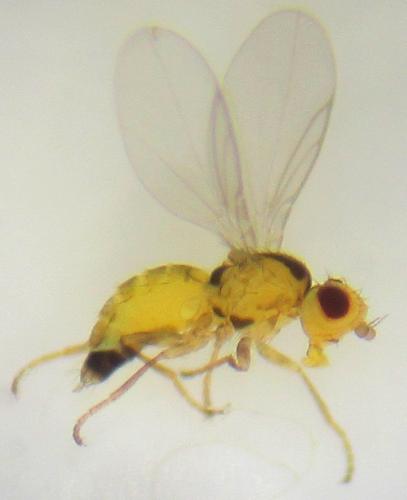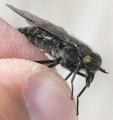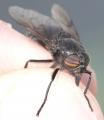Diptera.info :: Identification queries :: Diptera (adults)
Who is here? 1 guest(s)
|
[Ptochomyza asparagi] Agromyzidae???
|
|
| HDumas |
Posted on 14-04-2021 14:36
|
|
Member Location: Southern France Posts: 188 Joined: 24.04.09 |
Hello, 4 of these tiny flies were found in a rearing box containing galls on Asparagus acutiformis (supposed to be caused by Dasineura asparagi).  H. Dumas : France : La Ciotat : 13600 : 12/04/2021 Altitude : NR - Taille : 1 mm Réf. : 279271 We searched in Agromyziidae and the closest genus we found were Phytomyza/Napomyza, but wing venation doesn't fit exactly. So your opinion is wellcome 
Edited by HDumas on 14-04-2021 21:46 Greetings from Provence |
|
|
|
| John Carr |
Posted on 14-04-2021 19:01
|
|
Super Administrator Location: Massachusetts, USA Posts: 10410 Joined: 22.10.10 |
Should be Ptochomyza asparagi based on host, appearance, size, and range. A similar and slightly larger species is found in southeastern Europe.
Edited by John Carr on 14-04-2021 19:02 |
| John Carr |
Posted on 14-04-2021 19:04
|
|
Super Administrator Location: Massachusetts, USA Posts: 10410 Joined: 22.10.10 |
John Carr wrote: Should be Ptochomyza asparagi based on host, appearance, size, and range. A similar and slightly larger species is found in southeastern Europe. I checked again and P. asparagivora reaches at least as far north and west as Italy, so Ptochomyza sp. |
| HDumas |
Posted on 14-04-2021 22:20
|
|
Member Location: Southern France Posts: 188 Joined: 24.04.09 |
Many thanks John! I read in Lonsdale, O. (2015). A new Afrotropical species of Phytomyza in the subgenus Ptochomyza (Diptera: Agromyzidae). African Invertebrates, 56(3), 637-643. (here): Phytomyza asparagi can be differentiated by usually having only a single notopleural seta medially on the notopleuron, the acrostichal setulae are usually in two rows, the pleuron is yellow with two spots on the katepisternum and meron, and the phallus is a simple membranous tube with a shorter distiphallus than that seen in the new species. Phytomyza asparagivora has an arista similar to the new species and the two notopleural setae are positioned posteriorly... The only feature I'm able to check is the number of notopleural setae: I see only one, and it's in the middle of the notopleuron. So is Phytomyza asparagi more likely? I add a dorsal view for the three characteristic [of Ptochomyza] brown-to-black stripes that do not reach the posterior margin of the scutum ibid.  H. Dumas : France : La Ciotat : 13600 : 12/04/2021 Altitude : NR - Taille : 1 mm Réf. : 279346 Greetings from Provence |
|
|
|
| John Carr |
Posted on 14-04-2021 23:53
|
|
Super Administrator Location: Massachusetts, USA Posts: 10410 Joined: 22.10.10 |
If there is only one notopleura seta, it should be P. asparagi. P. asparagi also has straighter M vein, longer and thinner arista, and longer and hairier first flagellomere than P. asparagivora. Your fly probably has the straight M vein. I can not judge the other differences. |
| HDumas |
Posted on 15-04-2021 11:01
|
|
Member Location: Southern France Posts: 188 Joined: 24.04.09 |
Indeed M vein is straight. I can't appreciate either the other features unfortunatly. Many thanks again for your help John! Greetings from Provence |
|
|
|
| von Tschirnhaus |
Posted on 16-02-2023 13:57
|
|
Member Location: Bielefeld, Germany Posts: 454 Joined: 04.11.07 |
Agromyzidae: Ptochomyza asparagi Hering, 1942 confirmed. Compare my text for the sibling species asparagivora: https://diptera.info/forum/viewthread.php?forum_id=5&thread_id=108885 . This species was first detected as leaf mine in a bunch of flowers during a congress in China. |
| HDumas |
Posted on 24-04-2023 10:22
|
|
Member Location: Southern France Posts: 188 Joined: 24.04.09 |
Many thanks von Tschirnhaus for your confirmation and informations.
Greetings from Provence |
|
|
|
| Jump to Forum: |













